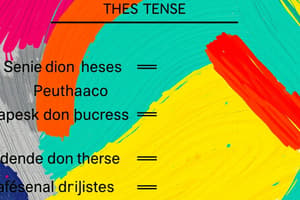Podcast
Questions and Answers
What is the function of the conditional tense in a sentence?
What is the function of the conditional tense in a sentence?
- To express a completed action in the past
- To express a future action
- To express a habitual action
- To express what we could or would do (correct)
What is the ending for the verb 'trabajar' in the conditional tense for 'nosotros'?
What is the ending for the verb 'trabajar' in the conditional tense for 'nosotros'?
- íamos (correct)
- ían
- ías
- íais
What is the correct form of the verb 'trabajar' in the conditional tense for 'él/ella/usted'?
What is the correct form of the verb 'trabajar' in the conditional tense for 'él/ella/usted'?
- trabajarías
- trabajaríamos
- trabajaría (correct)
- trabajaríais
What is the pattern for forming the conditional tense in Spanish?
What is the pattern for forming the conditional tense in Spanish?
What is the correct form of the verb 'trabajar' in the conditional tense for 'vosotros'?
What is the correct form of the verb 'trabajar' in the conditional tense for 'vosotros'?
How many irregular verbs are there in the conditional tense?
How many irregular verbs are there in the conditional tense?
What is the irregular stem for the verb 'decir' in the conditional tense?
What is the irregular stem for the verb 'decir' in the conditional tense?
What would 'él/ella' say in the conditional tense?
What would 'él/ella' say in the conditional tense?
What is the irregular stem for the verb 'tener' in the conditional tense?
What is the irregular stem for the verb 'tener' in the conditional tense?
What would 'yo' have in the conditional tense?
What would 'yo' have in the conditional tense?
How do the irregular verbs in the conditional tense work compared to the future simple tense?
How do the irregular verbs in the conditional tense work compared to the future simple tense?
What is the irregular stem for the verb 'hacer' in the conditional tense?
What is the irregular stem for the verb 'hacer' in the conditional tense?
What would 'nosotros' do in the conditional tense of the verb 'querer'?
What would 'nosotros' do in the conditional tense of the verb 'querer'?
What is the correct form of the verb 'salir' in the conditional tense for 'él/ella'?
What is the correct form of the verb 'salir' in the conditional tense for 'él/ella'?
What is the irregular stem for the verb 'poder' in the conditional tense?
What is the irregular stem for the verb 'poder' in the conditional tense?
What would 'éllos/ellas' have in the conditional tense of the verb 'tener'?
What would 'éllos/ellas' have in the conditional tense of the verb 'tener'?
What is the conditional tense form of the verb 'hacer' for 'yo'?
What is the conditional tense form of the verb 'hacer' for 'yo'?
What is the irregular stem of the verb 'valer' in the conditional tense?
What is the irregular stem of the verb 'valer' in the conditional tense?
What would 'nosotros' do in the conditional tense of the verb 'querer'?
What would 'nosotros' do in the conditional tense of the verb 'querer'?
What is the conditional tense form of the verb 'venir' for 'él/ella'?
What is the conditional tense form of the verb 'venir' for 'él/ella'?
What is the irregular stem of the verb 'caber' in the conditional tense?
What is the irregular stem of the verb 'caber' in the conditional tense?
What is the irregular stem for the verb 'hacer' in the conditional tense?
What is the irregular stem for the verb 'hacer' in the conditional tense?
What would 'vosotros' put in the conditional tense of the verb 'poner'?
What would 'vosotros' put in the conditional tense of the verb 'poner'?
What is the irregular stem for the verb 'querer' in the conditional tense?
What is the irregular stem for the verb 'querer' in the conditional tense?
What would 'él/ella' have in the conditional tense of the verb 'haber'?
What would 'él/ella' have in the conditional tense of the verb 'haber'?
What is the irregular stem for the verb 'saber' in the conditional tense?
What is the irregular stem for the verb 'saber' in the conditional tense?
Flashcards are hidden until you start studying
Study Notes
The Conditional Tense
- The conditional tense is used to express what someone could or would do.
- All verb groups in the conditional tense have the same endings.
Forming the Conditional Tense
- To form the conditional tense, keep the infinitive and add the following endings:
- Yo:ía
- Tú:ías
- Él/ella/usted:ía
- Nosotros:íamos
- Vosotros:íais
- Ellos/ellas/ustedes:ían
Examples of the Conditional Tense
- Trabajaría: I would work
- Trabajarías: You would work
- Trabajaría: He/She/You (formal) would work
- Trabajaríamos: We would work
- Trabajaríais: You (plural) would work
- Trabajarían: They would work
Conditional Tense Irregular Verbs
- There are 12 irregular verbs in the conditional tense that follow the same pattern as the irregular verbs in the future simple tense.
- To form the irregular verbs, learn the irregular stem and add the same endings as regular verbs.
Irregular Verbs and their Stems
- Caber: irregular stem is "cabr-"
- Decir: irregular stem is "dir-"
- Haber: irregular stem is "habr-"
- Hacer: irregular stem is "har-"
- Poder: irregular stem is "podr-"
- Poner: irregular stem is "pondr-"
- Querer: irregular stem is "querr-"
- Saber: irregular stem is "sabr-"
- Salir: irregular stem is "saldr-"
- Tener: irregular stem is "tendr-"
- Valer: irregular stem is "valdr-"
- Venir: irregular stem is "vendr-"
Conjugation of Decir and Tener in the Conditional Tense
- Decir:
- Yo: diría (I would say)
- Tú: dirías (You would say)
- Él/Ella: diría (He/She would say)
- Nosotros: diríamos (We would say)
- Vosotros: diríais (Ye would say)
- Ellos/Ellas: dirían (They would say)
- Tener:
- Yo: tendría (I would have)
- Tú: tendrías (You would have)
- Él/Ella: tendría (He/She would have)
- Nosotros: tendríamos (We would have)
- Vosotros: tendríais (Ye would have)
- Ellos/Ellas: tendrían (They would have)
Irregular Verbs in the Conditional Tense
- Caber (to fit): conditional stem is cabr-
- Yo: cabría
- Tú: cabrías
- Él/Ella: cabría
- Nosotros: cabríamos
- Vosotros: cabríais
- Ellos/Ellas: cabrían
Decir (to say) in the Conditional Tense
- Conditional stem is dir-
- Yo: diría (I would say)
- Tú: dirías (You would say)
- Él/Ella: diría (He/She would say)
- Nosotros: diríamos (We would say)
- Vosotros: diríais (Ye would say)
- Ellos/Ellas: dirían (They would say)
Tener (to have) in the Conditional Tense
- Conditional stem is tendr-
- Yo: tendría (I would have)
- Tú: tendrías (You would have)
- Él/Ella: tendría (He/She would have)
- Nosotros: tendríamos (We would have)
- Vosotros: tendríais (Ye would have)
- Ellos/Ellas: tendrían (They would have)
Other Irregular Verbs in the Conditional Tense
- Hacer (to do/make): conditional stem is har-
- Poder (to be able to/can): conditional stem is podr-
- Poner (to put): conditional stem is pondr-
- Querer (to want/love): conditional stem is querr-
- Saber (to know): conditional stem is sabr-
- Salir (to go out/leave): conditional stem is saldr-
- Valer (to be worth): conditional stem is valdr-
- Venir (to come): conditional stem is vendr-
Irregular Verbs in the Conditional Tense
- Caber (to fit): conditional stem is cabr-
- Yo: cabría
- Tú: cabrías
- Él/Ella: cabría
- Nosotros: cabríamos
- Vosotros: cabríais
- Ellos/Ellas: cabrían
Decir (to say) in the Conditional Tense
- Conditional stem is dir-
- Yo: diría (I would say)
- Tú: dirías (You would say)
- Él/Ella: diría (He/She would say)
- Nosotros: diríamos (We would say)
- Vosotros: diríais (Ye would say)
- Ellos/Ellas: dirían (They would say)
Tener (to have) in the Conditional Tense
- Conditional stem is tendr-
- Yo: tendría (I would have)
- Tú: tendrías (You would have)
- Él/Ella: tendría (He/She would have)
- Nosotros: tendríamos (We would have)
- Vosotros: tendríais (Ye would have)
- Ellos/Ellas: tendrían (They would have)
Other Irregular Verbs in the Conditional Tense
- Hacer (to do/make): conditional stem is har-
- Poder (to be able to/can): conditional stem is podr-
- Poner (to put): conditional stem is pondr-
- Querer (to want/love): conditional stem is querr-
- Saber (to know): conditional stem is sabr-
- Salir (to go out/leave): conditional stem is saldr-
- Valer (to be worth): conditional stem is valdr-
- Venir (to come): conditional stem is vendr-
Irregular Verbs in Spanish
- The verb "caber" means "to fit" and its irregular stem is "cabr-"
- The verb "decir" means "to say" and its irregular stem is "dir-"
- The verb "haber" (also means "hay" which means "there is/are") means "to have" and its irregular stem is "habr-"
- The verb "hacer" means "to do/make" and its irregular stem is "har-"
- The verb "poder" means "to be able to" (also means "can") and its irregular stem is "podr-"
- The verb "poner" means "to put" and its irregular stem is "pondr-"
- The verb "querer" means "to want/love" and its irregular stem is "querr-"
- The verb "saber" means "to know" and its irregular stem is "sabr-"
- The verb "salir" means "to go out/leave" and its irregular stem is "saldr-"
- The verb "tener" means "to have" and its irregular stem is "tendr-"
- The verb "valer" means "to be worth" and its irregular stem is "valdr-"
- The verb "venir" means "to come" and its irregular stem is "vendr-"
Conjugation of Decir (to say)
- Yo (I) would say: diría
- Tú (You) would say: dirías
- Él/Ella (He/She) would say: diría
- Nosotros (We) would say: diríamos
- Vosotros (Ye) would say: diríais
- Ellos/Ellas (They) would say: dirían
Conjugation of Tener (to have)
- Yo (I) would have: tendría
- Tú (You) would have: tendrías
- Él/Ella (He/She) would have: tendría
- Nosotros (We) would have: tendríamos
- Vosotros (Ye) would have: tendríais
- Ellos/Ellas (They) would have: tendrían
Studying That Suits You
Use AI to generate personalized quizzes and flashcards to suit your learning preferences.




